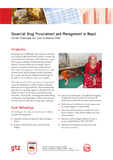Please use this identifier to cite or link to this item:
https://hdl.handle.net/20.500.14356/293Full metadata record
| DC Field | Value | Language |
|---|---|---|
| dc.contributor.author | GTZ/GFA Consulting Group GmbH | |
| dc.date.accessioned | 2012-12-30T21:22:50Z | |
| dc.date.accessioned | 2022-11-08T10:14:16Z | - |
| dc.date.available | 2012-12-30T21:22:50Z | |
| dc.date.available | 2022-11-08T10:14:16Z | - |
| dc.date.issued | 2009 | |
| dc.identifier.uri | http://103.69.126.140:8080/handle/20.500.14356/293 | - |
| dc.description.abstract | Introduction: Ensuring access to affordable and appropriate medicines is an important goal for all health systems. In Nepal, the current three-year health plan (2007-2009) sets a target of 95 percent availability of essential drugs in health facilities. Provision of free essential drugs is also an important component of the newly announced free basic health care programme, which from January 2009 has been rolled out to all people at district and below level. Under this initiative, selected essential drugs (22 for SHP and 32 for HP) are made freely available.This study examines the current system of drug procurement and management in Nepal. It makes recommendations for increasing its efficiency. These recommendations take on a particular urgency in the light of the free health care policy, which impacts on drugs financing and poses a risk of rapidly increasing and irrational drug consumption. The upgrading of 1,000 sub health posts to health post level also adds to drug supply challenges. | en_US |
| dc.publisher | GTZ/GFA Consulting Group GmbH | en_US |
| dc.subject | Essential Drug Procurement | en_US |
| dc.title | Essential Drug Procurement and Management in Nepal | en_US |
| dc.title.alternative | Current Challenges and How to Address Them | en_US |
| dc.type | Technical Report | en_US |
| Appears in Collections: | Post Graduate Grant (PG) Reports | |
Files in This Item:
| File | Description | Size | Format | |
|---|---|---|---|---|
| Essential_Drug_Procurement_Policy Brief (FINAL Print) (2).pdf | Research Report | 367 kB | Adobe PDF |  View/Open |
Items in DSpace are protected by copyright, with all rights reserved, unless otherwise indicated.
